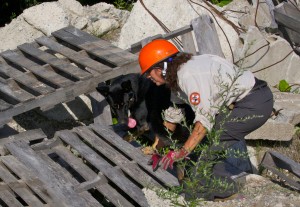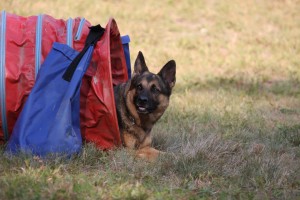Trialing Under the IRO Standards
K9 Testing Requirements
Dogs must be healthy, in good condition and have the endurance and strength to do the work required for their discipline.
All dogs must have some form of permanent identification (tattoo or micro-chip).
All dogs must have a registered Scorebook through FCI or an IRO member organization.
- Handlers may test more than one dog in one trial.
- Bitches in heat may participate in all tests, but must be kept apart from all the other participants and are to be tested at the end of the event.
- Sick and possibly contagious dogs are excluded from tests and must not be taken to the test site.
- If the dog shows poor obedience, the judge will give the handler 3 chances to recall the dog. If this exercise is accomplished after the 2nd command, the exercise will be down-graded by two grades. If the dog shows no obedience after the third voice command, the exercise will be discontinued.
- The judge is entitled to discontinue the activity if the dog is quite clearly ill-prepared, displays insufficient willingness to work, is obviously not under the control of its handler or if physical limitations can be clearly identified.
- Aggressive behavior from the dog entitles the judge to immediately disqualify the K9 team.
- The dog must have reached the required minimum age on the day of the test:
- RH-E level: dog must be 14 months old
- RH-A level: dog must be 18 months
- RH-B level: dog must be 20 months
- The judge will evaluate the dog for temperament throughout testing. This will include:
- Confidence and composure of the dog around strangers.
- Confidence and composure of the dog during unexpected disturbances.
- Resilience during difficult situations such as extended work periods, many dogs working simultaneously, extremes in temperature and weather, presence of dust and smoke, or strong unpleasant odors, etc.
- Additional temperament inadequacies such as gun shyness, nervousness and its associated aggressiveness, aggressive disposition, fearfulness, etc.
- Dogs must be on leash in the start position and when signing in and out with the judge.
- Dogs must wear a simple large link chain collar (such as a “fur saver”) during obedience and dexterity exercises. Prong and electronic/remote collars are not allowed.
- A judge is not allowed to judge dogs in his/her ownership, possession or who are currently residing with the judge.
Handler Requirements
- Must comply with the instructions of the judge.
- The judge is entitled to give a warning to a handler if he behaves in an unsportsmanlike manner or uses improper aid. After the first warning, 5 points will be taken off, after the 2nd warning the discipline will be discontinued and graded with unsatisfactory.
- Gross unsportsmanlike conduct by the handler entitles the judge to immediately disqualify the K9 team.
- The dog handler is liable for himself and his dog in the event of any accidents during the testing event. The owner of the dog must pay for any injuries or damages caused by his dog.
- Will have a scorebook for the dog
- Handlers must meet test registration deadlines and bring required paperwork (vaccination record, score book, micro-chip/tattoo information).
- Handlers must be suitably equipped and clothed for the relevant test category (for example, helmets, gloves, knee-pads, for rubble; SAR back-pack for area, etc.).
- Handlers are obligated to complete all disciplines, even if he has not reached a minimum score in any one discipline.
- A mistake (such as a faulty heel position) that is made throughout the obedience routine, should not be heavily weighted for every exercise.
Permitted Aids
The following aids are permitted as a means of tactical support for search work (specifically during the scent work):
- Whistle (before the exercise begins, the handler should notify the judge of the use of audible whistle sounds)
- Identifying harness and/or chain collar (lights and bells are allowed)
- Water and /or sponge

